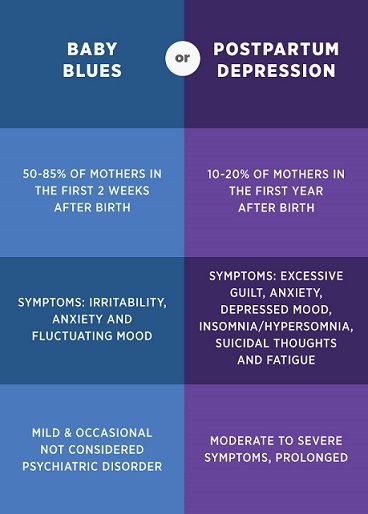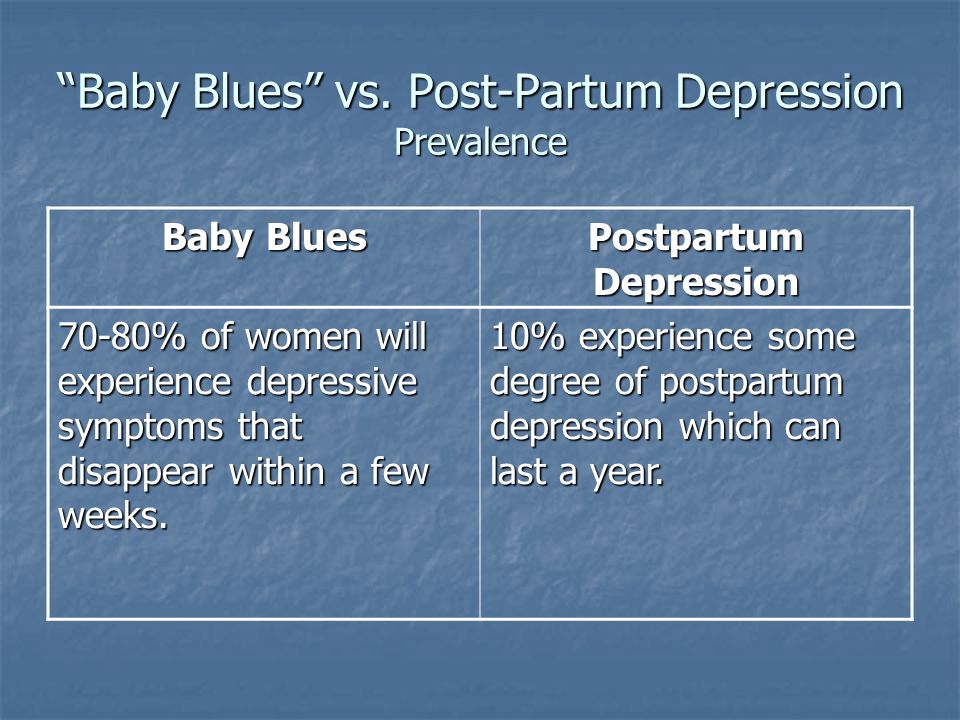This results in delayed treatment. Feel happy one minute and sad the next rapid mood swings.

Postpartum Support Um Upper Chesapeake Health
The baby blues and postpartum depression have a lot of symptoms in commonincluding low mood tearfulness and irritabilityand it can sometimes be difficult to tell the two conditions apart.

Baby blues vs postpartum depression. Postpartum depression on the other hand involves long-term feelings of sadness worthlessness and anxiety. The symptoms of postpartum blues are milder than those of postpartum depression and dont interfere with your ability to function or care for your baby. BABY BLUES VS POSTPARTUM DEPRESSION Postpartum Depression PPD can be differentiated from the baby blues by timing duration andor severity1-7 ONSET AND DURATION Baby Blues Postpartum Depression Generally peaks within first few days post- delivery and resolves without treatment within 2 weeks37.
This builds up to a point where the mother cannot take care of herself or her child. Postpartum depressionwhich affects as many as 1 in 5 womendoes share some of the same moodiness as postpartum blues but symptoms are generally more intense and disturbing. The baby blues.
Understanding the key differences. The differences between the postpartum baby blues postpartum depression and postpartum psychosis can be easily discerned as a gradient of increasingly serious symptoms. Postpartum depression poses more severe symptoms as compared to baby blues and typically lasts longer than a few weeks.
Baby blues die down after a couple of weeks whereas postpartum depression can last up until 12 months or even longer. The primary cause of PPD is the enormous shifting of. Postpartum depression PPD can be differentiated from the baby blues by timing duration andor severity.
However there are differences between baby blues syndrome and postpartum depression that need to be known. Hopelessness helplessness loss of desire to take care of oneself or the baby. Postpartum depression PPD can be differentiated from the baby blues by timingduration andor 1-7severity.
Treating depression in pregnancy can reduce the risk of depression after the baby is born. It is already clear that Baby Blue and Postpartum Depression share some very similar treats or symptoms that generally confuse many people. The consequences are similar to any other type of debilitating depression but youre at a very sensitive time in your life.
As a new parent you will go through periods of happiness joy sadness and frustration. Normal postpartum baby blues often result in quick mood swings and the feelings stem from the normal stressors of raising a newborn. ACOG RECOMMENDS THAT ALL PATIENTS SHOULD BE SCREENED FOR PPD USING A VALIDATED SCREENING TOOL8 ONSET AND DURATION BABY BLUES POSTPARTUM DEPRESSION The baby blues generally peaks within the first few days.
Understanding the Difference between Baby Blues Syndrome and Postpartum Depression Baby blues syndrome and postpartum depression are psychological disorders that mothers can experience after giving birth. At the birth of their first child nearly. Baby Blues vs Postpartum Depression.
Postpartum depression PPD is the most common of the six perinatal mood and anxiety disorders PMADs and affects about 1 in 7 new mothers. Learn more about how to prevent the baby blues here. The two of them are related.
But what if the normal blues dont disappear after two weeks following delivery or what if the feelings become more intense. While these conditions can be concerning they are all easily recognized and treated by a doctor. The baby blues typically resolves within 2-3 weeks after giving birth whereas Postpartum Depression symptoms continue for longer and may present several weeks or months after having a new baby or bringing one home-- PPD impacts adoptive parents as well as fathersnon birthing parents.
Some common symptoms include- 1. Onset and duration. With postpartum depression mothers get strong feelings of sadness anxiety and fatigue.
When the baby blues intensify and persist for more than a couple of weeks then you have the postpartum depression. Most consider baby blue as postpartum depression or vice versa. Generally your symptoms are more likely to be linked with postpartum depression if they are.
While the baby blues go away on their own postpartum depression can last for months or even years if not properly treated. It is one of the most common types of postpartum depression. Postpartum blues is a mild and short-term mood disorder that results after pregnancy.
For a mom caring for a new baby and other potentially older kids in addition to handling her usual responsibilities feeling depressed is particularly problematic. Baby Blues About 80 of mothers feel the baby blues or postpartum blues 35 days after giving birth. Sometimes termed the baby blues this condition is something that many new mothers experience.